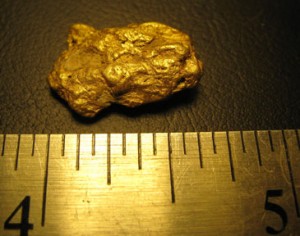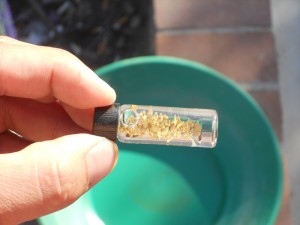Where to Sell Gold for Prospectors: Panned Nuggets, Raw Flakes, Dust

 Most people who get involved in amateur gold prospecting don’t ever find enough flakes or nuggets to worry about where to sell their gold. Recreational panning should be looked at as just that: recreation. If you aren’t having fun while you’re prospecting for gold local streams and creeks or metal detecting for nuggets in the desert, then you shouldn’t be doing it in the first place.
Most people who get involved in amateur gold prospecting don’t ever find enough flakes or nuggets to worry about where to sell their gold. Recreational panning should be looked at as just that: recreation. If you aren’t having fun while you’re prospecting for gold local streams and creeks or metal detecting for nuggets in the desert, then you shouldn’t be doing it in the first place.
But if you do end up finding enough gold to make a profit, where exactly should you go to sell it? Selling prospected or panned gold isn’t like selling your gold jewelry; you can’t simply go down the street to the nearest pawn shop and sell a vial of raw gold flakes or dust that you panned out of a local river. There’s a different process involved, and it takes a bit more time to convert your prospected going into money in your pocket.
The first step you need to take is to check out what the current selling price for gold per ounce is in today’s market. The market price of bullion will have a lot to do with what you will be able to get for your flakes, dust and nuggets. And here’s an important thing to remember: you will NOT get as much money for selling unrefined, raw gold as you would for selling a gold ring, earrings or necklace. A buyer of raw gold will have to pay for the refining process, so this knocks a few bucks off what you can sell it for.
Secondly, you have to put your gold through a testing process to see how pure it is . . . this testing process is called “assaying” your gold. Gold that is in the raw form of flakes, nuggets or dust will always have impurities, and you need to find out exactly how pure your panned or prospected gold really is.
 You can get your gold assayed through a number of different channels. There are companies that you can find online that will assay the raw gold for you and purchase if outright, although they tend to pay less. You can also try to locate a local assayer in your state (regardless of where you live, you should be able to find a few to choose from).
You can get your gold assayed through a number of different channels. There are companies that you can find online that will assay the raw gold for you and purchase if outright, although they tend to pay less. You can also try to locate a local assayer in your state (regardless of where you live, you should be able to find a few to choose from).
Luckily, most places that have the ability to assay your gold will also be interested in buying it from you, so you might not have to go through the process of finding a gold dealer to sell it to. If you can’t find someone to sell your gold to, try checking out the BLM (Bureau of Land Management) in your state. This agency is in charge of overseeing gold mining and prospecting, and they can probably give you a list of dealers and buyers in your state.
Also, one relatively new development in selling raw gold is the internet. Some of the most profitable sellers in the country now sell their gold nuggets and flakes on online auction sites like eBay. And don’t discount the possibility of taking any small nuggets to local jewelry stores, where the owners might be interested in purchasing them for unique jewelry designs.
When you do settle on a buyer to sell your gold to, make sure that you remember to record any profits you make (you have to report this to the IRS on your tax returns). Also keep in mind that you can sometimes write off any expenses you incur during the process of prospecting, panning and assaying your gold (ask your tax accountant about what equipment and operating costs can be legally written off on your tax forms).

